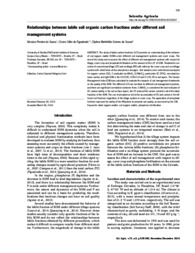Relationships between labile soil organic carbon fractions under different soil management systems.
Relationships between labile soil organic carbon fractions under different soil management systems.
Author(s): SOUZA, G. P. de; FIGUEIREDO, C. C. de; SOUSA, D. M. G. de
Summary: ABSTRACT: The study of labile carbon fractions (LCF) provides an understanding of the behavior of soil organic matter (SOM) under different soil management systems and cover crops. The aim of this study was to assess the effect of different soil management systems with respect to tillage, cover crop and phosphate fertilization on the amount of the LCF of SOM. Treatments consisted of conventional tillage (CT) and no-tillage (NT) with millet as the cover crop and a no-tillage system with velvet bean at two phosphorus dosages. Soil samples were collected and analyzed for organic carbon (OC), C oxidizable by KMnO4 (C-KMnO4), particulate OC (POC), microbial biomass carbon and light SOM in the 0.0-0.05, 0.05-0.10 and 0.10-0.20 m soil layers. The Carbon Management Index (CMI) was calculated to evaluate the impacts of soil management treatments on the quality of the SOM. The different LCFs are sensitive to different soil management systems, and there are significant correlations between them. C-KMnO4 is considered the best indicator of OC carbon lability. In the soil surface layers, the CT reduced the carbon content in all of the labile fractions of the SOM. The use of phosphorus led to the accumulation of OC and carbon in the different soil fractions regardless of the tillage system or cover crop. The application of phosphate fertilizer improved the ability of the NTsystem to promote soil quality, as assessed by the CMI.
Publication year: 2016
Types of publication: Journal article
Unit: Embrapa Cerrados
Observation
Some of Embrapa's publications are published as ePub files. To read them, use or download one of the following free software options to your computer or mobile device. Android: Google Play Books; IOS: iBooks; Windows and Linux: Calibre.
Access other publications
Access the Agricultural Research Database (BDPA) to consult Embrapa's full library collection and records.
Visit Embrapa Bookstore to purchase books and other publications sold by Embrapa.

